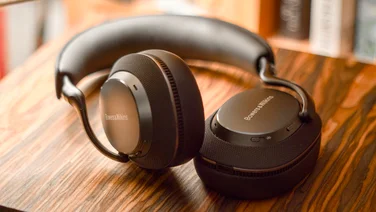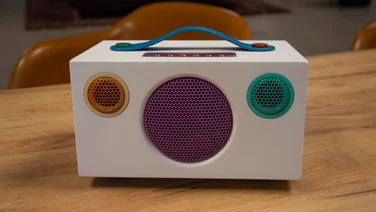To help us provide you with free impartial advice, we may earn a commission if you buy through links on our site. Learn more















- Incredible bass
- Astonishingly loud
- Stylish design
- Recessed mids
- Expensive
- Clunky connectivity
In 2015, Devialet released a wireless speaker unlike any other. The Phantom was packed with exciting design ideas, pushing the world of speaker design well out of its comfort zone and into the realms of science fiction. Somehow, however, it still delivered audio that was out of this world.
Three years on and – following its partnership with Sky to create the less exotic Sky Soundbox – the French firm is back with a new product: the Devialet Phantom Reactor. Taking cues from the full-sized Phantom, the Reactor shrinks down the audiophile trickery yet still promises to fill your living room with incredible sound.
READ NEXT: Devialet Gold Phantom review (published on our sister site, Alphr)
Devialet Phantom Reactor review: What you need to know
The Reactor is half the size of its larger sibling: it equates to three litres in volume and weighs 4.5kg. By comparison, the larger Phantom is six litres in volume and weighs 11.4kg. Its smaller size doesn’t compromise connectivity, though. This speaker has Bluetooth, Wi-Fi and auxiliary analogue and digital inputs.
Much like its larger predecessor, the Reactor is also a mono speaker. If you’re looking for stereo sound, you’ll need to pair it with another Reactor.
Ultimately, the Reactor is aimed at those who want a powerful speaker but have limited space. With its unique design, it’ll also look great in any room. But with no digital assistant support and a wallet-crunching price tag, it’s not for everyone.















READ NEXT: Naim Mu-So for Bentley review: The Bentley of wireless speakers
Devialet Phantom Reactor review: Price and competition
The new speaker starts at £990 for the Reactor 600, while the more powerful Reactor 900, which I have on review here, costs £1,290. The numbers in the names refer to the number of watts of amplification in each.
The older line of Phantom speakers now sits under the firm’s “Premier” umbrella and consists of the £1,490 Classic Phantom, the £1,890 Silver Phantom and the £2,490 Gold Phantom. With 1,200W, 3,000W and 4,500W of amplification respectively, these aren’t just much more expensive than the Reactor, they’re also significantly more powerful.
Elsewhere, there are plenty of stylish, great-sounding speakers vying for your cash: the Naim Audio Mu-So Qb is £548, the more powerful Mu-So costs £995, and the Samsung AKG VL5 is £600. If you want to go stereo, the LEF LSX offer fantastic audio quality in a highly stylish, all-in-one package; they cost £999.
READ NEXT: Sky Soundbox review
Devialet Phantom Reactor review: Design and features
You may have come across the Reactor’s predecessors in Harrods or a flagship Apple Store. These curvaceous, space-age audio eggs look like no other speakers with their strange shape, front-facing full-range driver and bulbous bass drivers set, pod-like, on each side.
The Reactor is basically the same but around half of the size. It’s 219mm deep, 157mm wide and 168mm tall but, despite that, it’s still pretty meaty, weighing a not-insubstantial 4.5kg. This is not a speaker you’ll want to be moving around too much once you’ve got it in place.















Despite the similarities between the Reactor and its bigger brethren, though, there are a few subtle points of difference. Most obviously, the Reactor is only available in white. There are no flashy gold panels here. It’s plain, gloss plastic all the way, interrupted only by the thick black lines created by the gap around the side panel and bass drivers on each side. It’s a beautifully minimalist, almost Bauhaus look.















At the top of the speaker towards the front are five capacitive controls, softly backlit so you can see them in the dark: volume up and down, play/pause, one for Bluetooth pairing, and a “link” button used for Wi-Fi pairing. At the rear are a power button, an eight-pin power input, an RJ45 Ethernet connector and a 3.5mm auxiliary/optical jack. The latter jack also has an option within the Devialet app to reduce latency – this is to minimise the lip sync delay.
The Phantom Reactor is primarily a wireless speaker but, given that, it’s curiously light on features. The first problem is that Bluetooth support is limited to SBC or AAC – there’s no aptX or aptX HD here, let alone support for the high-bit-rate LDAC codec.















The “online” Wi-Fi connection (enabled via the Devialiet app), meanwhile, comprises merely Spotify Connect, AirPlay connectivity for iPhone owners, and UPnP support for Android phone users. That’s not a problem, per se. Apps such as Bubble UPnP can be used to fill the gaps here, from music files stored on your phone to streaming services such as Qobuz, Tidal and Google Music.
However, with other manufacturers such as Sonos, KEF and Naim all producing their own software to integrate such things, it does make the Reactor feel a little more clunky to use than its rivals.















There’s also no physical remote control, no built-in virtual assistant support nor means to communicate with your smartphone’s assistant. Even switching off the speaker is a faff. The power button at the back of the unit seems to fail to fully turn off the device. Instead, the Reactor remains in standby.
READ NEXT: Best Bluetooth speakers: Portable, indoor, waterproof and budget Bluetooth speakers
Devialet Phantom Reactor review: Sound quality
Sonically, the Phantom Reactor is a scaled-down version of its larger sibling, the Phantom. Producing the all-important audio are two aluminium bass drivers on either side and a single aluminium full-range driver at the front. Unlike the regular model, there’s no dedicated tweeter for dealing with the upper frequencies. It’s also worth bearing in mind that the speaker also runs one mono channel; if you want stereo, you’ll need to purchase another Reactor.
My tests are based on the more powerful Reactor 900. This has a quoted 900W of amplification, 300W more than the £990 Reactor 600. Despite their size, the Reactors hit an ear-punishing maximum volume of 98dB and 95dB SPL respectively. No matter what volume I cranked the Reactor 900 to, it never faltered.















And, despite its small size, the Reactor has irresistible sub- and mid-bass reproduction. The two bass drivers on either side of the speaker move air in a way that can only be described as floor-pounding and chandelier-rattling. Galantis’ “Runaway (U & I) (Dillon Francis Remix)” sounds incredible; that sub-bass rumble gets you off your feet, and the speaker’s strong, mid-bass shunt is hard to ignore. Not only that but the degree of control the Reactor exerts over the music is hugely impressive. For a speaker of its size, the Reactor is remarkable.















Unfortunately, that low-end reproduction has its ramifications. The mids are laid back and recessed, vocals are drowned out by the heavy mid-bass slam and songs such as “Tell Your Friends” by The Weeknd sound overly bombastic. This isn’t what I’d expect from a speaker costing so much; by comparison, the Samsung AKG VL5 and Naim Audio Mu-So are more neutral and sound more balanced overall.
As for the high frequencies, the lack of tweeter means the Reactor 900 treble sounds a touch rolled off in the treble, certainly, when compared with its bigger brother, which is much more capable in this regard.
Finally, the speaker’s soundstage is a touch on the closed side. It just doesn’t have the same width or depth as some of its competitors. Having said that, instrument separation is still excellent.















READ NEXT: Samsung AKG VL5 (VL550) review: An innovative smart speaker
Devialet Phantom Reactor review: Verdict
All in all, Devialet has succeeded in what it set out to achieve with the Phantom Reactor. It has taken all the technology from the Phantom and squeezed it into a more compact body, making it slightly cheaper in the process. Although the word “cheaper” is somewhat academic when we’re talking about a speaker that starts at £990.
If you’ve always been tempted by the outlandish design, unusual audio engineering and big sound of the Devialet Phantom, the Phantom Reactor could be the answer to all your prayers. Just be aware that it’s not the best wireless speaker for Android users and not the most sonically refined speaker for the money, either.






